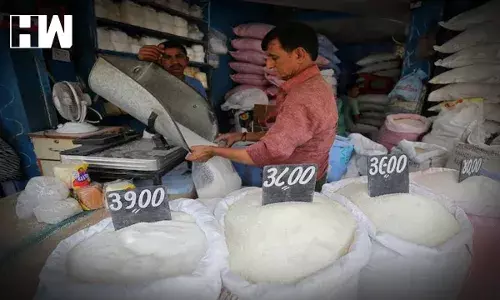New Delhi: In a bid to soar the taming food inflation, the government has announced that it would restrict sugar exports to 100 lakh metric tonnes (LMT), beginning from next month.
According to two different notifications, the country will only allow the sweetener to be exported with licences. The export limit is in effect from October to September of each marketing year.
For the first time in six years, sugar export restrictions have been imposed. In 2016, the country imposed a 20% export charge on the sweetener, the last time it did so.
India is the world’s second-largest sugar producer and exporter behind Brazil. Export restrictions by India will send international prices soaring in the middle of a global commodities-price spiral. The government has also set up a cross-ministry panel to monitor prices of all imported commodities, especially industrial raw materials, the official cited above said.
These actions, together with the May 13 ban on private wheat exports, which had a global impact by driving up prices, signal a tough posture to rein in spiraling inflation. Consumer prices soared to an eight-year high of 7.79 percent in April, well exceeding the Reserve Bank’s tolerance level of 6% for four months in a row, endangering growth and inflaming public anxiety.
As millers around the world attempt to turn more sugarcane into ethanol products, a lesser cane harvest in the world’s leading producer Brazil and high global oil prices have raised worldwide demand for Indian sugar.
Export restrictions will make more surplus sugar accessible for domestic ethanol production, which is a primary government objective and has new fuel-blending targets.
Mixing petrol with ethanol, which is made from molasses, a byproduct of sugar, will help lessen the amount of oil India imports. “In order to find a permanent solution to address the problem of excess sugar, government is encouraging sugar mills to divert excess sugarcane to ethanol,” an official statement on May 19 said.
Last Wednesday, the Union Cabinet adopted amendments to the National Policy on Biofuels 2018, including a five-year delay in the goal of mixing 20% ethanol in gasoline from 2030 to 2025-26. India is the world’s third-largest importer and consumer of oil. According to figures from the energy ministry’s Petroleum Planning & Analysis Cell, its crude oil import bill in FY22 was US$ 119.2 billion, up from US$ 62.2 billion the previous fiscal year.
In sugar season 2020-21, traders exported 7 million tonnes (MT) of sugar, against target of 6MT and this represents a 15-times jump in exports since 2017-18.
The Indian Sugar Mills Association said, India’s output in the current season is expected to be 35MT while domestic consumption is about 27MT. Current stocks include last season’s 8MT, making for a surplus of 16MT.
As an independent media platform, we do not take advertisements from governments and corporate houses. It is you, our readers, who have supported us on our journey to do honest and unbiased journalism. Please contribute, so that we can continue to do the same in future.

